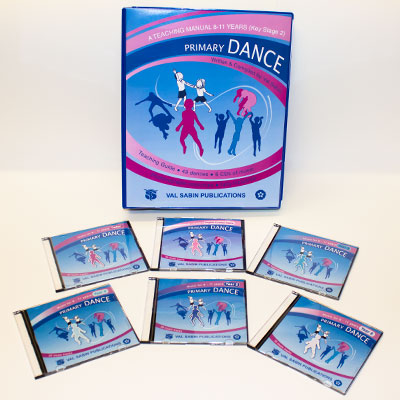Val Sabin Primary School Dance KS2 (8-11 Years):

- User-friendly scheme for the whole school.
- A complete scheme of work for Primary School Dance Year 3, 4, 5 and 6 (8-11 Years).
- Teaching guide including planning and assessment sheets.
- 137 lesson plans.
- 49 dances.
- 6 CDs containing 195 tracks of music created for the dances.
- Tudor Dance and English Country Dance units.
- Photocopiable resources (in the purchaser’s school only).
- Links to literacy and other areas of the curriculum.
- Exceeds National Curriculum requirements.
Dance Key Stage 2 Sample Pages
Dance Training
Introduction to the Dance manual
It contains a complete, progressive scheme of work for dance for Primary School Dance Key Stage 2 (8-11 Years). It is complete with its own specially composed and arranged music on 6 CDs. The 19 units of work each have 6 to 10 lesson plans providing 137 lesson plans in total that progress and develop 49 dances using 195 tracks of music.
The Teaching Guide
The teaching guide gives practical and definite guidance on planning, teaching styles and strategies, choosing and using stimuli for dance, and suggestions for additional forms of accompaniment. It describes the movement material or language of dance, examines the essential aspects of composing, performing and appreciating, and describes how dances are made. Dance activities appropriate for each age group are linked to National Curriculum requirements. Minimum Expected Standards are identified and assessment sheets provided.
The Teaching Material
The detailed teaching material has been organised to form a complete and detailed scheme comprising 4 units of creative dance for each year group (each unit contains between 6 and 10 lesson plans). In addition to these units there is a Traditional and Historical section at the back of the manual containing units of English Country Dance and Tudor Dance suitable for all year groups.
Every creative dance is preceded by a page giving a brief description of the dance, stimuli and suggested resources.
There are 67 pages of photocopiable resources in the appendices, in the form of cards, pictorial stimuli, text and poems.
In addition, there are suggestions on how the dances may be further extended, developed and enriched.
The Whole Scheme
The whole scheme has been written to develop children’s knowledge, skills and understanding, in a progressive manner. Learning Objectives, Expected Learning Outcomes and dance frameworks clarify planning and focus learning. The lesson plans are written in great detail so they can be used immediately as they stand or adapted to suit the expertise or teaching style of the teacher or the attitude and ability of the class.
The Lesson Plans
The lesson plans have been tried and tested, however, the rate at which individual classes progress may be very different. Whatever the rate of progress there will always be more than enough material in each lesson plan for one lesson and indeed, in some cases, could be extended to 2 or even 3 lessons.
Dance Stimuli and links with the wider curriculum
The dances arose from a wide range of stimuli including tactile, characters, masks, story, legend, poems, words, music, sport, natural occurrence, forms of greeting, social, moral and environmental issues etc. These dances encourage children to respond to:
- a range of stimuli
- improvise freely
- acquire and develop specific dance skills
- select and apply appropriate movements to express dance ideas.
Children are also encouraged to understand, develop and use a range of compositional ideas, develop their use of relationships with others and group organisation, improve both their own and others’ work and understand the value of “getting ready” and “ending” activities.
The Dance music
The music includes a range of cultural rhythms, pop, reggae, rap, ethereal, lyrical, sound effects, music that tells a story etc. and is presented in a user-friendly way. If there are several sections to a dance the sections are presented individually on tracks for ease of practise as well as in the composite form of the complete dance.
This enables the reader to isolate the section for practice and also means that any one section could be taken out and used to develop a dance which is complete in itself e.g. “interdependence” from “Rainforest” or “colliding snooker balls” from the “Snooker Championship”.
How can you use the scheme?
Long Term Planning
In the Teaching Guide the unit titles are set out in a grid to enable easy identification of Long Term Planning. There is more than enough material available for each year group and this enables schools and teachers to exercise choice when planning. The co-ordinator (in discussion with staff) identifies which of the four units of work will be used in each year group and places them in the relevant time slots.
Medium Term Planning
At the beginning of each unit of work, the medium term plan is detailed. It contains learning objectives, unit framework and expected learning outcomes together with a full page of suggestions for linked classroom activities. For Foundation Stage the Medium Term Plan follows the same format, but in addition outcomes are linked to early learning goals.
Short Term Planning
The detailed lesson plans form the short-term planning. The detailed content allows teachers to use them in a way which is compatible with their levels of confidence and skill.
Price
£130.00 (Hardback)
Please contact us to place your order.

